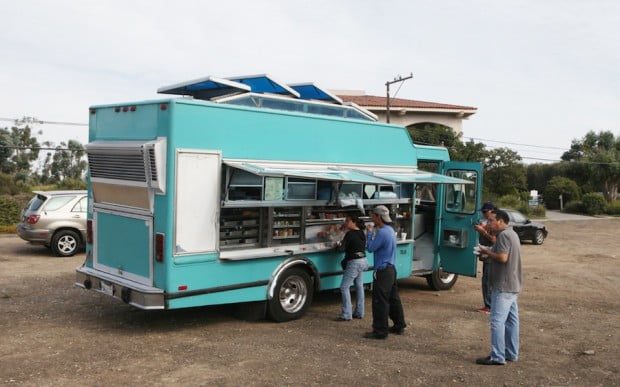
Citing potential lawsuits, the Malibu City Council on Monday declined to pursue an ordinance regulating food trucks in city limits, instead turning to a little-known provision in state transportation law to prohibit them from parking on Pacific Coast Highway.
Point Dume residents have recently complained of trash and traffic caused by the trucks.
“Other cities, for a change, are taking the lead in being sued by industry representatives,” City Attorney Christi Hogin said, poking fun at several lawsuits the city has battled over the past few years.
The idea of imposing regulations upon food trucks, junk trucks and mobile billboards in the city first came about at a meeting in September when a resident complained of trash and traffic caused by food trucks in the Heathercliff Road and PCH area. Residents have also complained of too many junk trucks and mobile billboards parking for several days along local roadways to advertise their services.
But Hogin advised the council to wait on the outcome of current cases against other local cities that have been sued for trying to regulate the presence of food trucks.
Instead, the council asked the Malibu/Lost Hill’s Sheriff’s Department to start enforcing an existing state law that prohibits vending along Pacific Coast Highway. It also directed staff to request the county health department to increase health inspections on food trucks in the city.
During the research process for a possible ordinance, Hogin’s staff came across a specific regulation in California state law that bans vending on PCH, but not on side streets. Staff immediately notified the Malibu/Lost Hills Sheriff’s Station about the enforceable law.
“It’s not often we find ordinances within the state highway code that actually benefit us,” quipped City Manager Jim Thorsen.
Sheriff’s deputies began issuing courtesy notices to PCH vendors a few weeks ago and are now enforcing the state law by issuing citations. They can also cite vehicles such as mobile billboards that stay parked for more than 72 consecutive hours.
Thorsen said the city hopes to have these problems solved in the next two to three months.
Edison rep rebukes criticism in wake of recent outages
After a recent wave of power outages across Malibu, Edison spokesman Mark Olson called the recent string of local power losses “an unusual occurrence” during a presentation to City Council on Monday.
More than 7,000 Southern California Edison customers in Malibu lost power in four separate outages between Nov. 10 and Nov. 21. On Nov. 10, a tree fell and knocked down a major line at Bonsail Drive and PCH, leaving more than 4,000 customers in west Malibu without power for at least 12 hours.
Last week on Nov. 21, nearly 2,400 customers lost power when an underground Edison switch failed and had to be replaced. Power came back on for most of those customers within two hours, but some were in the dark until the next morning.
Local activist Hans Laetz questioned Edison on the scale of the outages and believes the company’s Malibu grid is outdated. Laetz has warned that ongoing windstorms could ultimately cause further outages and poles to be knocked over, similar to the 2007 Malibu Canyon fire that caused $14.5 million in damages and burned dozens of cars and structures.
Edison is continuously inspecting equipment and conducting ongoing upgrades, according to Olson.
“The work that we’ve done and continue to do is upgrade the system,” Olson said. “Some people think we don’t upgrade the system but we do.”
Mayor Lou La Monte briefly floated the idea of undergrounding Malibu’s power lines. The process could cost approximately $5 million per mile of power lines, according to Olson.
“The cost would be so prohibitive [to Edison],” Olson said. “The luxury is paid by requester usually.”
The city would also have to consider how to accommodate cable and telephone companies that attach their wires to power lines owned by Edison.
